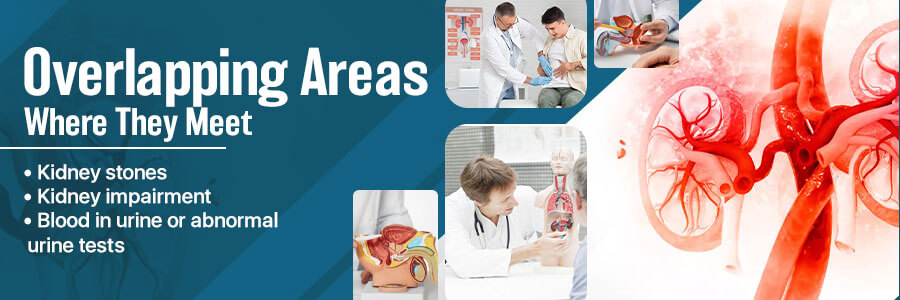To schedule an appointment call: 1 (800) 605-0031
To schedule an appointment call: 1 (800) 605-0031

Many people use “kidney doctor” or “urinary surgeon” interchangeably — but in the medical world, urology and nephrology are distinct specialties. What is the difference between urology and nephrology? Understanding what each does can help you find the right doctor for urinary, kidney, or reproductive concerns. In this post, we’ll break down the roles, conditions treated, and when to see each specialist.
Nephrology is the branch of internal medicine that focuses on the kidneys and overall renal function. Nephrologists diagnose and treat ailments like chronic kidney disease, electrolyte imbalances, glomerulonephritis, and disorders of blood pressure that affect kidney health.
These doctors manage medical (non-surgical) treatments — prescribing medications, ordering dialysis, adjusting diets, and monitoring lab values to protect kidney function over time.
Urology is a surgical and medical specialty dealing with the urinary tract and male reproductive system. Urologists handle issues involving kidneys, bladders, ureters, urethra, and male genital organs.
They perform surgeries for kidney stones, prostate enlargement or cancer, bladder issues, urinary incontinence, and male sexual health problems. They’re also the go-to for structural or anatomical urinary problems.

Because kidneys are part of the urinary system, urology and nephrology sometimes overlap:
In more complex cases, both specialists collaborate to cover procedure-based needs and long-term kidney health.
See a nephrologist if your lab work suggests kidney strain or decline (for example, eGFR falling below normal ranges, rising creatinine), if you have persistent protein or blood in urine without a structural cause, difficult-to-control blood pressure, or electrolyte problems. Early referral improves outcomes and helps you plan if kidney function continues to drop.
Look for a urology clinic near me if you have pain with urination, frequent infections, urinary blockage, visible blood in urine, incontinence, trouble starting or stopping urine, testicular pain or lumps, prostate concerns, or suspected structural issues (stones, strictures, prolapse). Urologists can examine the urinary tract directly and operate when needed.
If you’re unsure, start with primary care. They can review your symptoms and labs, then direct you to the right specialist.
What is the difference between urology and nephrology? Both may prescribe medicines; the key difference is that urologists also perform operations on the urinary tract and male reproductive organs, while nephrologists focus on medical management of kidney function.
With a nephrologist, common tests include:
With a urologist, you might have:
Urinary leakage, pelvic organ prolapses, and overactive bladder are common and treatable. A subspecialty called urogynecology focuses on pelvic floor disorders in women, offering options from pelvic floor therapy and medications to minimally invasive procedures (e.g., slings, bulking agents, neuromodulation, or Botox injections for the bladder). If symptoms like urgency, leakage, or prolapse affect daily life, a referral to a urology/urogynecology team can help.
Children may see pediatric urologists for structural issues such as reflux (backflow of urine), hydronephrosis, undescended testicles, or congenital anomalies. Pediatric nephrologists manage medical conditions like nephrotic syndrome, inherited kidney disorders, and hypertension. Your pediatrician will help decide which specialist fits the problem best. (Scope of practice parallels adult care but is tailored to growth and development.)
Kidney stones are a perfect example of teamwork:
For urinary symptoms related to an enlarged prostate (BPH), urologists and maybe even podiatry doctors offer a spectrum of treatments — from medicines to office procedures and surgeries. One common operation is TURP, which trims tissue to improve urine flow; laser procedures and minimally invasive approaches are also used based on prostate size and symptom severity.
If you’re told you have CKD, staging is typically based on eGFR (a number that estimates filtering capacity). Stages range from mild changes to severe decrease in kidney function. Knowing your stage helps guide how often to check labs, adjust medications, and plan ahead if function declines. Early visits with a nephrologist support better long-term planning.
Bring:
For urology, be ready to discuss urinary symptoms in detail (frequency, urgency, leakage, pain, blood in urine, sexual or prostate concerns). For nephrology, expect a focus on labs, blood pressure patterns, swelling, and overall health.
So, what is the difference between urology and nephrology? Understanding the differences plays a crucial role in making the right choice, and choosing the right specialist early can save time, avoid unnecessary referrals, and help you get more effective treatment. If your issue is structural — like a blockage or stone — urology likely comes first. If your issue is functional — abnormal labs, kidney stress — nephrology is safer ground. And in many real-world cases, both disciplines work together so your surgical and medical bases are covered. If you need to see either, visit Samaritana Medical Clinic.
Must Read: What Are the 4 Stages of Rheumatoid Arthritis: Everything You Need to Know